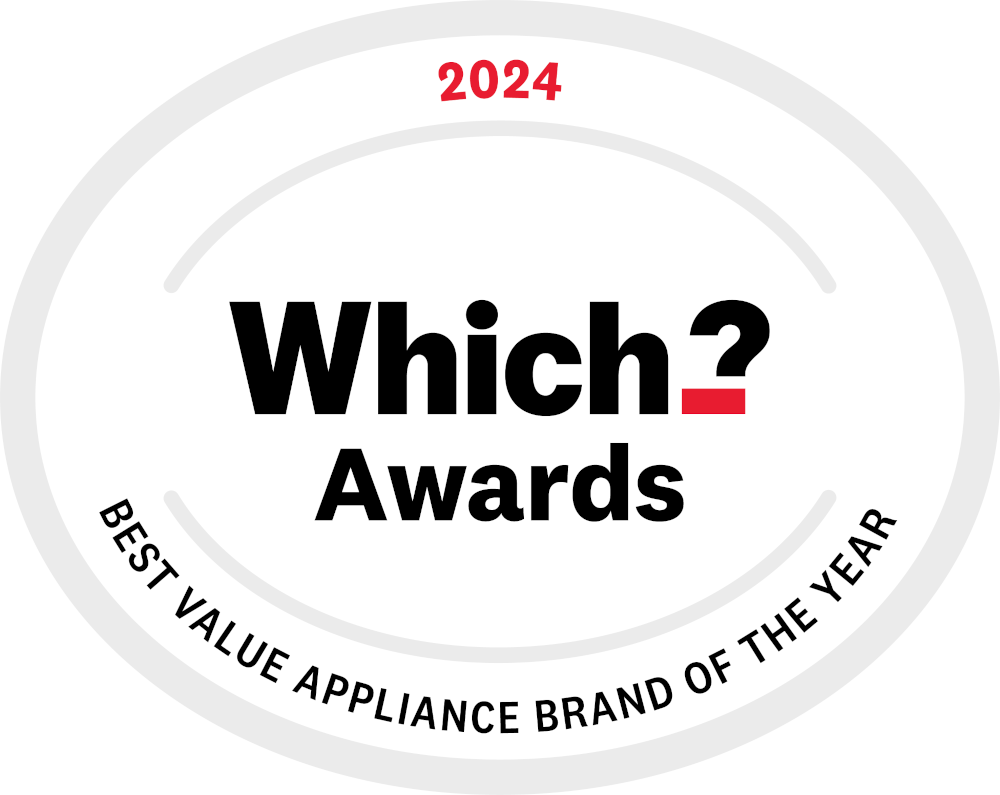What Appliances Use The Most Electricity?
Do you know how much energy is being used by the items set up around your home?
According to a survey of 2,000 UK adults carried out by EDF, 72% of Brits[1] cannot say which household electrical appliances use the most energy.
In this guide we’ll explore some of the appliances that typically consume the most electricity and show you how you can reduce your running costs with clever usage tips and energy-efficient Beko technology.
The running costs of household appliances can vary significantly depending on the type of appliance, how frequently you use it, and the energy tariffs in your area. This guide will look at different types of appliances, including tumble dryers, washing machines, dishwashers, fridge freezers and ovens, and their associated costs, so you can make an informed decision about the best models for your household. We’ll also explore practical tips to help you reduce your running costs even further.
Estimated Annual Running Costs by Appliance
| Appliance Type | Average Annual Running Cost |
|---|---|
| Condenser tumble dryer | £668 |
| Washer dryer | £409 |
| American style fridge freezer | £197 |
| Heat pump tumble dryer | £227 |
| Fridge freezer | £134 |
| Full-size dishwasher | £97 |
| Slimline dishwasher | £83 |
| Washing machine | £76 |
Washing Machines
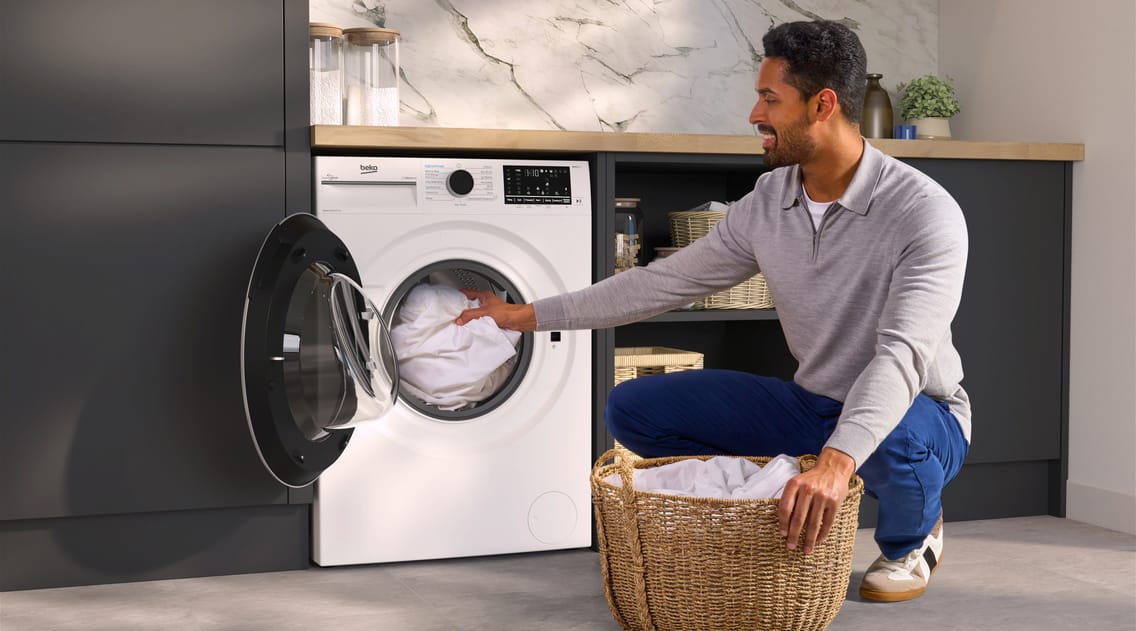
Washing machines play a central role in everyday life, and with the right model and usage habits, you can keep energy costs down while still achieving outstanding cleaning results.
On average, a washing machine costs £76 to run per year[2]. In comparison, a washer dryer costs £409 on average per year[3] to run, making it especially important to choose an energy-efficient model and use it as effectively as possible. The energy cost is calculated based on the assumption that all laundry is washed and then dried to full dryness. So, if you don’t use the drying function as often as the washing cycle, you’ll save energy.
Using the Eco programme for normally soiled laundry remains the most efficient way to wash, both in terms of electricity and water consumption, and should be the first choice whenever possible.
However, as the Eco cycle tends to take longer, Beko has developed EnergySpin technology for those times when you need a quicker wash or want to use one of the special programmes. This innovation helps reduce energy use while still delivering great results, even on shorter cycles.
Beko’s EnergySpin technology uses specially designed drum movements, this innovation dissolves detergent more effectively while optimising heat usage. This innovation helps achieve up to 35% energy savings across all everyday wash cycles, without compromising on cleaning quality.
To help you maximise efficiency and reduce running costs with your washing machine, here are some easy tips to keep in mind:
- Always fill the drum to capacity without overloading it.
- Wash at a lower temperature to save on water heating costs.
- Pre-treat heavily stained clothes to avoid needing to rewash items.
- Choose the Eco programme wherever possible-it remains the best cycle for minimising both energy and water usage.
Tumble Dryers
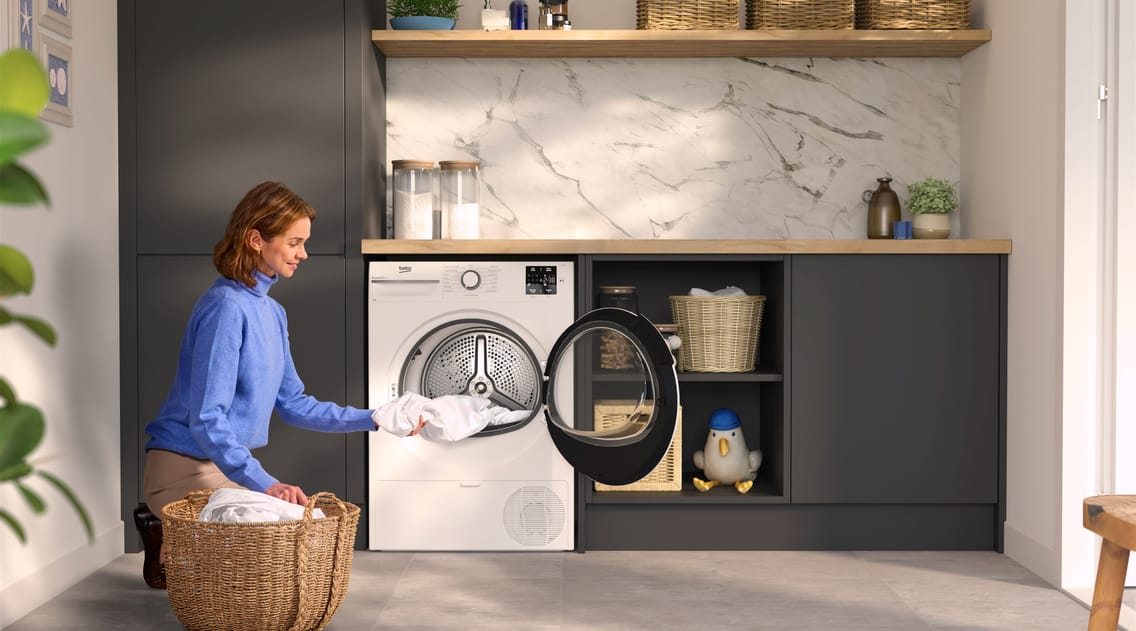
Tumble dryers offer a quick and convenient way to dry clothes, especially when outdoor drying isn't possible. They also help reduce the risk of mould forming indoors, which can occur when moisture builds up from drying clothes inside. However, depending on the type of dryer you use, they can contribute noticeably to your household energy bills. Choosing a more energy-efficient model, like a heat pump tumble dryer, can help you enjoy the benefits of faster drying while keeping running costs lower.
On average, a condenser tumble dryer costs £668 to run per year[4], while a heat pump tumble dryer costs just £227 per year[5]. These figures highlight just how much you could save by choosing a more efficient appliance.
For a detailed breakdown, check out our full guide: How Much Does a Tumble Dryer Cost to Run.
To help you keep running costs low and get the best performance from your tumble dryer, here are some simple efficiency tips to follow:
- Spin clothes at a high speed in the washing machine beforehand to reduce moisture and shorten drying time.
- Use a sensor drying programme to automatically stop the cycle as soon as the optimal dryness level has been reached.
- Clean tumble dryer filters regularly to ensure maximum efficiency, as blocked filters mean the appliance’s motor needs to work harder using more energy.
Dishwashers
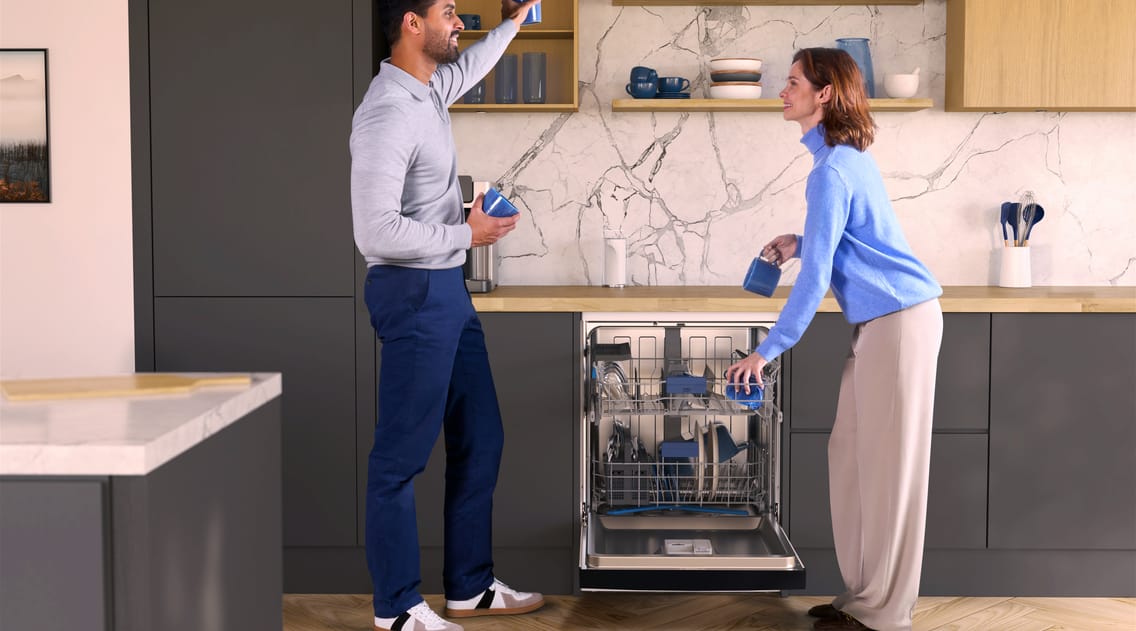
Dishwashers are more efficient than handwashing, using significantly less water and energy, particularly when full.
Beko dishwashers are designed to deliver outstanding results with minimal consumption. Some models use as little as 6 litres of water per cycle, while features like AquaIntense® and CornerIntense™ ensure powerful cleaning even for the dirtiest pots and pans.
On average, a full-size dishwasher costs around £97 per year[6] to run, while a slimline dishwasher costs approximately £83 per year[7].
To help you keep running costs low and get the best performance from your dishwasher, here are some simple efficiency tips to follow:
- Avoid pre-rinsing; simply scrape plates before loading.
- Always run full loads where possible.
- Use the half load setting if you need to run the dishwasher before it’s full.
- Opt for the Eco programme where available — it is the most energy- and water-efficient choice for everyday dishwashing needs.
- Remember to clean the filter regularly to maintain the quality of the wash and avoid running extra cycles.
Fridge Freezers
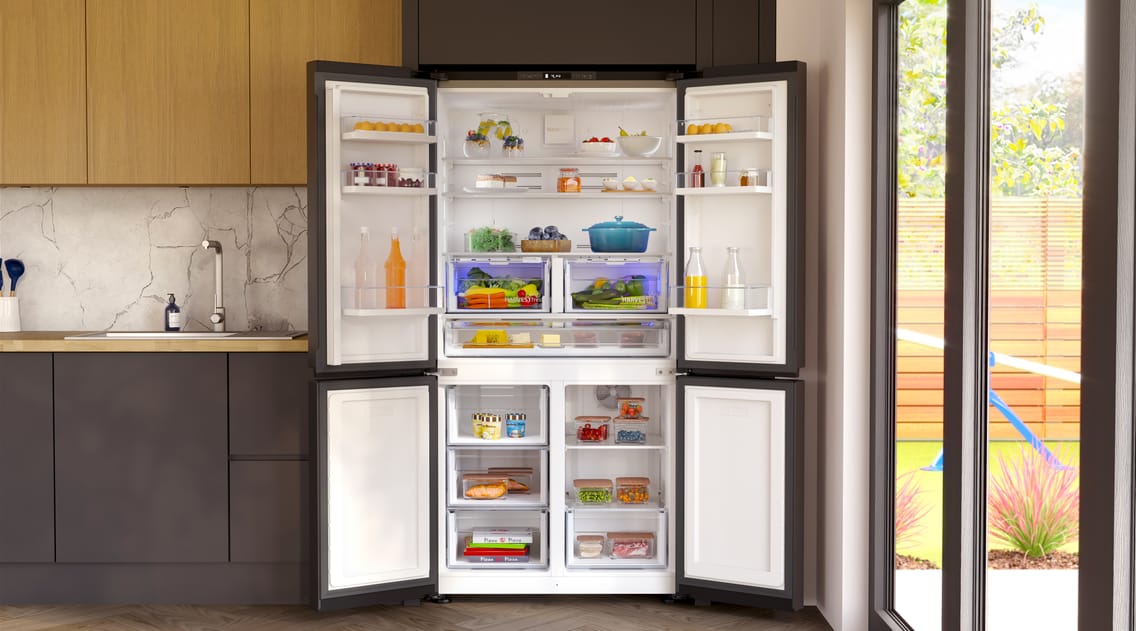
Fridge freezers are essential for keeping your food fresh and safe, operating 24 hours a day. As a result, they are one of the few household appliances that consume energy continuously.
On average, a fridge freezer costs around £134 per year[8] to run, while an American-style fridge freezer costs approximately £197 per year[9]. Selecting a model with a high energy efficiency rating can help you minimise these ongoing costs.
To help you maximise efficiency and reduce running costs with your fridge freezer, here are some simple tips to follow:
- Set your fridge to around 4°C and your freezer to -18°C to maintain ideal storage temperatures without wasting energy.
- Avoid overfilling the compartments to allow proper air circulation and help your appliance operate efficiently.
- Position the fridge freezer away from direct sunlight or heat sources such as ovens and radiators.
- Check that door seals are clean and intact to prevent cold air from escaping.
- Try to avoid keeping the fridge freezer door open longer than necessary, as this allows warm air in and forces the appliance to work harder to return to the correct temperature.
Ovens
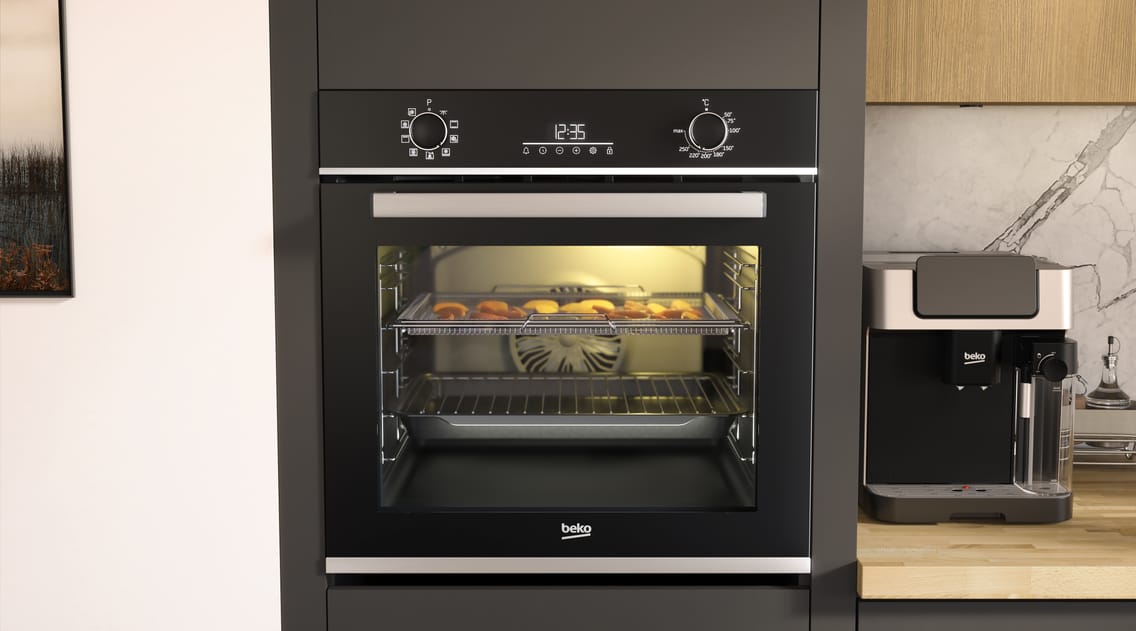
Ovens are essential in the kitchen, but they can also account for a noticeable portion of household energy use, particularly when cooking for long periods.
Our ovens featuring Split&Cook® technology allow you to use just half of the oven’s capacity or operate two cavities at different temperatures at once. This flexibility means you can cook more efficiently, reduce cooking times, and save energy without compromising on your favourite meals.
To help you cook more efficiently and keep your oven's energy consumption to a minimum, here are a few simple tips to follow:
- Avoid opening the oven door during cooking — up to 25% of heat can escape.
- Defrost food thoroughly before placing it in the oven to reduce cooking time.
- Switch the oven off a few minutes early and let residual heat finish the cooking.
With these simple tips and Beko’s innovative, energy-efficient appliances, you can enjoy the best of home living while keeping your energy costs manageable.
Explore our full range of energy-saving appliances and start making smarter, more sustainable choices for your home today.
Sources
[1] https://www.edfenergy.com/media-centre/news-releases/confusion-over-appliances-could-be-costing-britons-hundreds-energy-bills
[2] Uses the YourEko tool calculation that compares the annual energy consumption of all washing machines in the market, based on Eco 40-60 programme (used by the EU Energy Label Standard) and 284 cycles per year. Energy tariff of 34p kWh. Date of calculation: November 2022.
[3] Uses the YourEko tool calculation that compares the annual energy consumption of all washer dryers in the market, based on the wash and dry programme (used by the EU Energy Label Standard) and 284 cycles per year. Energy tariff of 34p kWh. Date of calculation: November 2022.
[4] Uses the YourEko tool calculation that compares the annual energy consumption of all condenser dryers in the market, based on the Cotton cupboard dry programme (used by the EU Energy Label Standard) and 260 cycles per year. Energy tariff of 34p kWh. Date of calculation: November 2022.
[5] Uses the YourEko tool calculation that compares the annual energy consumption of all heat pump dryers in the market, based on the Cotton cupboard dry programme (used by the EU Energy Label Standard) and 260 cycles per year. Energy tariff of 34p kWh. Date of calculation: November 2022.
[6] Uses the YourEko tool calculation that compares the annual energy consumption of all Full-Size Dishwashers in the market, based on the Eco programme (used by the EU Energy Label Standard) and 254 cycles per year. Energy tariff of 34p kWh. Date of calculation: November 2022.
[7] Uses the YourEko tool calculation that compares the annual energy consumption of all Slimline Dishwashers in the market, based on the Eco programme (used by the EU Energy Label Standard) and 254 cycles per year. Energy tariff of 34p kWh. Date of calculation: November 2022.
[8] Uses the YourEko tool calculation that compares the annual energy consumption of all combi (50/50, 60/40, 70/30 and 80/20 split) fridge freezers in the market based on the EU Energy Label Standard. Energy tariff of 34p kWh. Date of calculation: November 2022.
[9] Uses the YourEko tool calculation that compares the annual energy consumption of all American fridge freezers in the market based on the EU Energy Label Standard. Energy tariff of 34p kWh. Date of calculation: November 2022.

